
Union Agriculture Minister, Shri Narendra Singh Tomar inaugurated National Conference on Agriculture for Kharif Campaign 2023-24 on 03-05-2023 at NASC Complex, New Delhi. Addressing Conference, he emphasized that agriculture remains prime pulse of the Indian economy and is at the core of the socio-economic development of the country. It accounts for around 19 per cent of the GDP and about two-thirds of the population is dependent on the sector.
Shri Tomar expressed happiness that India’s agriculture sector has been witnessing robust growth with an average annual growth rate of 4.6 per cent over the last six years. This has enabled agriculture and allied activities sector to contribute significantly towards country overall growth, development and food security. As per 2nd Advance Estimates (2022-23), production of foodgrains in the country is estimated at 3235 lakh tonnes which is higher by 79 lakh tonnes than the production of foodgrains during 2021-22. Record production is estimated of rice, maize, gram, pulses, rapeseed and mustard, oilseeds and sugarcane. Total production of sugarcane in the country during 2022-23 is estimated at record 4688 lakh tonnes which is higher by 1553 lakh tonnes than the average sugarcane production. As per the 3rd Advance Estimates of Horticulture, a record 3423.3 lakh tonnes of horticultural production are estimated in 2021-22 which is 77.30 lakh tonnes higher over production of 2020-21.
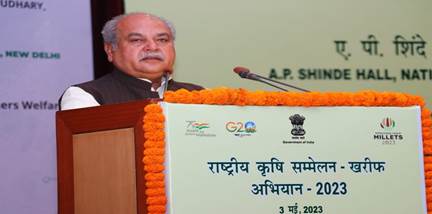
The objective of this conference was to review and assess the crop performance during the preceding crop seasons and fix crop-wise targets for Kharif season in consultation with State Governments, ensure supply of critical inputs and facilitate adoption of innovative technologies with a view to enhance production and productivity of the crops. The priority of government is agro-ecological based crop planning for diversion of land from excess commodities like rice and wheat to deficit commodities like oilseeds and pulses and high value export earning crops. Special Mustard programme was initiated during rabi 2020-21 that has brought most spectacular results. Mustard production has jumped by 40% from 91.24 to 128.18 lakh tonnes in last 3 years. The productivity saw 11% increase from 1331 to 1447 kg/ha. The area under rapeseed & mustard enhanced by 29% from 68.56 lakh ha in 2019-20 to 88.58 lakh ha in 2022-23. Timely action by central and state government made this remarkable achievement possible.
The Minister shared that India organized The Global Millets (Shree Anna) Conference at IARI campus, PUSA, New Delhi on 18th of March 2023 as part of major celebration of International Year of Millets. Dedicating to the International Year of Millets (IYM) 2023, the Hon’ble Prime Minister unveiled commemorative coin and stamp celebrating IYM followed by digital launch of a book of millets (Shree Anna) standards. The Prime Minister declared ICAR-IIMR as Global Centre of Excellence which was followed by screening of a short film on Shree Anna & IYM 2023. Ministry of Agriculture and Farmers Welfare is ensuring that IYM is celebrated in a structured way throughout the year by organizing regular meetings (In person/ video conferencing) with all the stakeholders. Expert Institutes such as ICAR-IIMR, APEDA, ICRISAT and others are also involved to encourage R&D, productivity and value addition.
The Conference set the national targets for production of foodgrains and other commodities. National targets for total food grains production set at 3320 lakh tonnes for the year 2023-24. Target for production of pulses have been fixed at 292.5 lakh tonnes compared to 278.1 lakh tonnes this year and oilseeds production will be increased from 400 to 440 lakh tonnes in 2023-24. Total Shree Anna production has to be increased from 159.1 lakh tonnes in 2022-23 to 170.0 lakh tonnes in 2023-24. The strategy would be to increase area through inter-cropping and crop diversification and productivity enhancement through introduction of HYVs and adoption of suitable agronomic practices in low yielding regions.
Addressing the Conference, Sh. Kailash Choudhary, MoS (Agriculture and Farmers Welfare) hoped that global demand for millets is set to rise, consequent to the celebration of the year 2023 as the International Year of Millets (IYM), This will provide us a unique opportunity to increase production, ensure efficient processing and consumption, promote a better utilization of crop rotations, and encourage better connectivity throughout food systems to promote millets as a key component of the food basket. Due to its multi-functionality, millets hold considerable potential to contribute to economic and ecological diversification, climate resilience, and food & nutritional security. Widely recognized as “Smart Food” or “Nutri-Cereals”, millets play a crucial role in transforming agri-food systems, across the globe. India is set to become International Hub for millets.
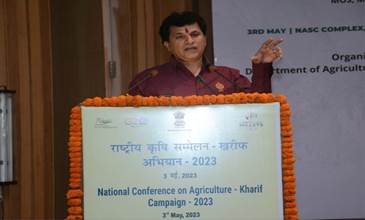
In his deliberation he said that there is significant increase in oilseeds and pulses still more stress should be given for further increase in the production of seeds and pulses. For the all the government facilities, schemes and information of agriculture must be given through FPO for its effective implementation.
Shri Manoj Ahuja, Secretary (Agriculture & Farmers Welfare), said that the country is maintaining an increasing trend in food grain production since 2015-16. The government has taken measures to augment crop and livestock productivity, ensure certainty of returns to the farmers through price support (Minimum Support Price), promote crop diversification and has made focused interventions to enhance credit availability, facilitate mechanization and boost horticulture and organic farming. As a result, agriculture exports touched a historic high growth in 2021-22. As compared to previous year 2020-21, the agri and allied export has increased from 41.86 billion USD in 2020-21 to 50.24 billion USD in 2021-22 i.e. an increase of 19.99%. For modernization of agriculture and facilitate farmer, government launched the SATHI (Seed Traceability, Authentication and Holistic Inventory) Portal and Mobile App, a Centralized Online System for seed traceability, authentication and inventory designed to deal with the challenges of seed production, quality seed identification and seed certification.
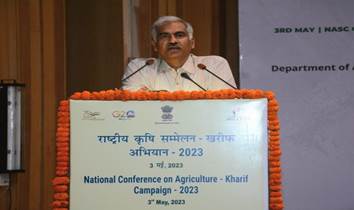
Further he stated that to combat the adverse weather conditions the single window advisory system should be adopted for issuing the weather-related issues to the farmers. For the improvement of the soil health card system this year new initiative will be in place for which agriculture graduates will be given an opportunity to work on implementation of SHC.
Shri Arun Baroka Secretary (Fertilizers) assured timely supply of fertilizers for forthcoming kharif season. The government also announced to convert more than 3.25 lakh fertilizer shops across the country as Pradhan Mantri Kisan Samruddhi Kendras. These will be centres where farmers can buy not only fertilizers and seeds but also implement soil testing and avail useful information about farming techniques. Further, he provided the information about Integrated fertilizer management system (IFMS) for the detail information about the fertilizer and related issues. In his deliberation he has given the information on the PM PRANAM and PM Kisan Samridhi Kendra he advised farmer should use organic inputs.
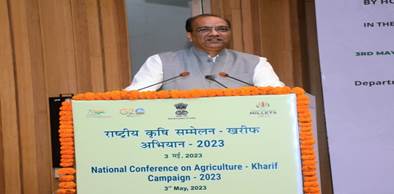
Dr. Himanshu Pathak, Secretary (DARE) and Director General, ICAR shared recent technological advances made in the agriculture for the benefits of the states and preparing plan of development accordingly. He stressed on using bio-fortified and climate resilient varieties to fulfill dream of food and nutritional security for all. Further in his deliberation he has highlighted for the improvement of varieties which are climate resilient and newly released and bio fortifies varieties should be used.
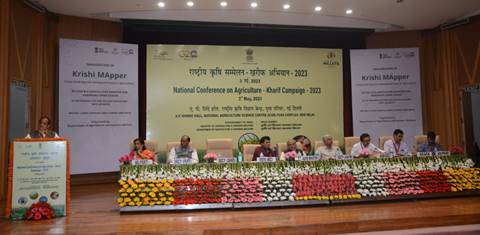
Detailed presentations were made on status of fertilizer supply by Additional Secretary (fertilizers), on agri stack for digitization in agriculture by Additional Secretary (Agriculture) on financial issues on released by additional secretary and financial advisor. JS (Crops) made a presentation on prospects and strategies for ensuing Kharif season. The state principal secretaries Maharashtra, Jharkhand and Odisha presented their strategies for Kharif preparedness and implementation. Presentation on Pradhan Mantri Fasal Bima Yojana was made by CEO of PMFBY, thereafter on Drought Management, Annual Action Plan of RKVY and Digital Extension plans were shared in details by respective Joint Secretaries.
Additional Secretary (Agriculture) and senior officers from DA&FW, ICAR and officers of different State Governments participated in the National Conference. This was followed by an interaction session with Agriculture Production Commissioners and Principal Secretaries of all the States to raise issues concerning their states for increasing area coverage, production and productivity during Kharif season 2023.
*****
SS/NSK

